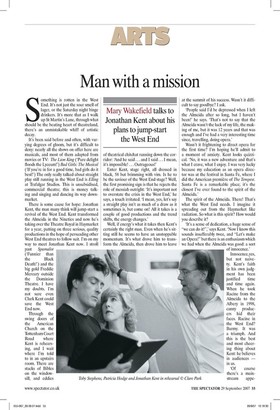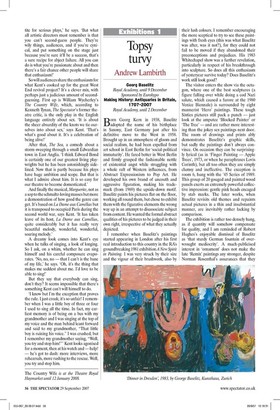Man with a mission
Mary Wakefield talks to Jonathan Kent about his plans to jump-start the West End Something is rotten in the West End. It's not just the sour smell of lager, or the Saturday night binge drinkers. It's more that as I walk up St Martin's Lane, through what should be the beating heart of theatreland, there's an unmistakable whiff of artistic decay.
It's been said before and often, with varying degrees of gloom, but it's difficult to deny: nearly all the shows on offer here are musicals, and most of them adapted from movies or TV: The Lion King (Pure delight floods the Lyceum!') Bad Girls: The Musical (If you're in for a good time, bad girls do it best!') The only really talked-about straight play still running in the West End is Elling at Trafalgar Studios. This is unsubsidised, commercial theatre; this is money talking and singing and dancing its way downmarket.
There is some cause for hope: Jonathan Kent, the man many think will jump-start a revival of the West End. Kent transformed the Almeida in the Nineties and now he's taking over the Theatre Royal in Haymarket for a year, putting on three serious, quality productions in the hope of persuading other West End theatres to follow suit. I'm on my way to meet Jonathan Kent now. I stroll past Spamalot – (Funnier than the Black Death!') and the big gold Freddie Mercury outside the Dominion Theatre. I have my doubts. I'm not sure even Clark Kent could save the West End now.
Through the swing doors of the American Church on the Tottenham Court Road where Kent is rehearsing, and I wait where I'm told to in an upstairs room. There are stacks of Bibles on the windowsill, and eddies of theatrical chitchat running down the corridor: 'And he said ... and I said ... I mean, it's impossible! ... Outrageous!'
Enter Kent, stage right, all dressed in black, 58 but brimming with vim. Is he to be the saviour of the West End stage? Well, the first promising sign is that he rejects the role of messiah outright: 'It's important not to overstate the crisis in the West End,' he says, a touch irritated. 'I mean, yes, let's say a straight play isn't as much of a draw as it sometimes is, but come on! All it takes is a couple of good productions and the trend shifts, the energy changes.'
Well, if energy's what it takes then Kent's certainly the right man. Even when he's sitting still he seems to have an unstoppable momentum. It's what drove him to transform the Almeida, then drove him to leave at the summit of his success. Wasn't it difficult to say goodbye? I ask.
'People said I'd be depressed when I left the Almeida after so long, but I haven't been!' he says. 'That's not to say that the Almeida wasn't the luck of my life, the making of me, but it was 12 years and that was enough and I've had a very interesting time since, travelling, doing opera.'
Wasn't it frightening to direct opera for the first time? I'm hoping he'll admit to a moment of anxiety. Kent looks quizzical. 'No, it was a new adventure and that's what I crave, what I enjoy. I was very lucky because my education as an opera director was at the festival in Santa Fe, where I did the American premiere of The Tempest. Santa Fe is a remarkable place; it's the closest I've ever found to the spirit of the Almeida.'
The spirit of the Almeida. There! That's what the West End needs. I imagine it spreading out from the Haymarket like radiation. So what is this spirit? How would you describe it?
'It's a sense of dedication, a huge sense of "we can do it!",' says Kent. 'Now I know this sounds insufferably twee, and "Let's make an Opera!" but there is an enthusiasm which we had when the Almeida was good: a sort of innocence.'
Innocence,yes, but not naivety. Kent's faith in his own judgment has been justified time and time again. When he took Racine from the Almeida to the Albery in 1998, canny producers hid their faces. Racine in the West End? Barmy. It was a triumph. And this is the best and most cheering thing about Kent: he believes in audiences — in us.
'Of course there's a mainstream appetite for serious plays,' he says. 'But what all artistic directors must remember is that you can't second-guess people. They're wily things, audiences, and if you're cynical, and put something on the stage just because you're sure it'll be a success, that's a sure recipe for abject failure. All you can do is what you're passionate about and then there's a fair chance other people will share that enthusiasm!'
So will audiences share the enthusiasm for what Kent's cooked up for the great West End revival project? It's a clever mix, with perhaps just a judicious amount of secondguessing. First up is William Wycherley's The Country Wife, which, according to Kenneth Tynan, The Spectator's former theatre critic, is the only play in the English language entirely about sex. At is about the sheer absurdity of the knots we tie ourselves into about sex,' says Kent. 'That's what's good about it. It's a celebration of being alive!'
After that, The Sea, a comedy about a storm sweeping through a small Edwardian town in East Anglia. 'I think Edward Bond is certainly one of our greatest living playwrights but he has been astonishingly sidelined. Now that is partly because his plays have huge ambition and scope. But that is what I admire about him It is so easy for our theatre to become domesticated.'
And finally the musical, Marguerite, not as a sop to the schmaltz-loving masses but more a demonstration of how good the genre can get. It's based on La Dame awc Camelias but it is transposed to occupied Paris during the second world war, says Kent. 'It has taken leave of its host, La Dame awc Camelias, quite considerably but it has really very beautiful melody, wonderful, wonderful, soaring melody.'
A dreamy look comes into Kent's eye when he talks of singing, a look of longing. So I ask, on a whim, whether he can sing himself and his careful composure evaporates. 'No, no, no — that I can't is the bane of my life,' he says. 'Oh, it's the thing that makes me saddest about me. I'd love to be able to sing!'
But they say that everybody can sing, don't they? It seems impossible that there's something Kent can't will himself to do.
'I know but I'm the exception that proves the rule. I just croak; it's so unfair! I remem- ber when I was a little boy of three or four I used to sing all the time. In fact, my ear- liest memory is of being on a bus with my grandmother and I was singing at the top of my voice and the man behind leant forward and said to my grandmother, "That little boy is ruining his voice." I was crushed, but I remember my grandmother saying, "Well, you try and stop him!" ' Kent looks agonised for a moment, then at his watch and — help! — he's got to dash: more interviews, more rehearsals, more rushing to the rescue. Well, you try and stop him
























































 Previous page
Previous page